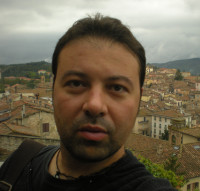Natural Catastrophes
Climate Change
Earthquakes & Seismic Hazards
Industries Activities
Post-Doctoral Fellowships
Greece
2016.08.31
Understanding fluid-induced seismicity to mitigate the risks of man-made earthquakes
Elucidating the physical mechanisms involved with injecting fluids into a heterogenous ground
To understand exactly what is happening beneath our feet after fluids are injected into the ground, Dr. Georgios Michas intends to elucidate the precise physical processes involved with the diffusion of pore pressure – the pressure exerted by fluids on underground formations –, in the highly heterogeneous crust. To achieve his aim, Dr. Michas will conduct laboratory experiments subjecting rock samples to hydraulic fracturing. He will then monitor the propagation of pore pressure inside the sample by recording the acoustic emissions produced, and look at how the rock fractures in the presence of pressurized fluids. The next step will be to compare the observations obtained with real cases of fluid-induced earthquakes for which data is available. Finally, he will compile his results into a model of how pore-pressure propagates in time and space.
Since 2009, there has been a dramatic increase in earthquakes in the Central United States. This preoccupying phenomenon has been imputed to the injection of waste water from oil and gas operations into deep disposal wells by the United States Geological Survey (USGS). “The situation is pushing the government to change the legislation on oil extraction ”, reports Dr. Michas. “This is an example of why we need to be able to know where fluid injections can safely be made, and where they absolutely can’t ”. Even if man-made earthquakes don’t usually measure more than 4 to 5 on the Richter scale, a couple of them have reached a magnitude of 6 and even 7. The deadly Koynanagar quake of 1967 in India, which occurred after the reservoir behind a dam was filled up, measured 6.5 for instance. Dr. Georgios Michas’s research aims to provide a modeling tool capable predicting how fluids behave in the Earth’s crust. The ultimate goal is to prevent the potentially devastating consequences that could result from man-made earthquakes.

Georgios
MICHAS
Institution
School of Applied Science Technological Educational Institute of Crete
Country
Greece
Nationality
Greek
Related articles
Climate Change
Finance, Investment & Risk Management
Societal Challenges
Climate Adaptation & Resilience
Insurance & Risk Management
Environmental Justice
Civil Society & Governance
AXA Project
Italy
AXA Research Lab on Climate Change, Risk and Justice
In response to three research questions: How can the private and financial sectors contribute to a just transition to a... Read more

Gianfranco
PELLEGRINO


